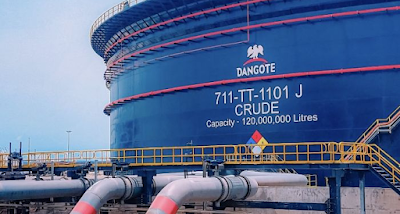As Nigeria’s refining capacity grows, the battle between importers and refiners highlights a broader shift in the country’s oil sector
“When refineries and pipelines function, their tank farms become obsolete”
Fuel Importers Face Extinction as Nigeria’s Refining Boom Takes Hold – Report
Nigeria’s fuel importers could soon be out of business if they fail to adapt to the rise of local refining, warns the Crude Oil Refinery Owners Association of Nigeria (CORAN). The shift comes as the Federal Government reinstates the naira-for-crude deal, a policy driving down fuel prices but sparking fierce resistance from importers.
In a recent interview, CORAN’s Publicity Secretary, Eche Idoko, dismissed claims by the Depot and Petroleum Products Marketers Association of Nigeria (DAPPMAN) that the naira-for-crude policy harms the economy.
Idoko argued that importers, who rely on storing and selling imported fuel, are fighting the policy to protect their profits. “They’re like water drum sellers who don’t want pipes to work. When refineries and pipelines function, their tank farms become obsolete,” he said.
The naira-for-crude deal, reinstated by President Bola Tinubu, allows local refineries like Dangote to buy crude in naira, slashing petrol prices from N1,100 to N860 per litre. While consumers celebrate, importers claim they’re losing billions—up to N76.5 billion monthly—due to Dangote’s price cuts forcing them to sell below cost.

Idoko urged depot owners to rethink their business models to stay relevant as Nigeria emerges as a refining hub. “We’ve invited them to strategize with us, but they’re stuck on importing substandard fuel,” he said. He warned that their refusal to adapt could lead to their collapse, as local refining is “here to stay.”
He also accused importers of inflating fuel prices by acting as middlemen with no real investment. “They connect Nigerian consumers to international traders, pocket profits, and walk away. They don’t want local refining to succeed because it cuts them out,” Idoko explained.
DAPPMAN, led by Executive Secretary Olufemi Adewole, has called for the naira-for-crude deal’s cancellation, arguing it threatens Nigeria’s foreign exchange stability and global trade. “Crude oil trades in dollars for stability. This policy risks isolating Nigeria from international markets,” Adewole said. However, the Federal Government ignored the plea, doubling down on the policy to bolster local refining.
Idoko countered that scrapping the deal would reverse progress, noting that petrol prices were climbing toward N700 per litre before its suspension in March.
With global crude prices falling, he argued, local refining could drive prices even lower if not for importers’ resistance. As Nigeria’s refining capacity grows, the battle between importers and refiners highlights a broader shift in the country’s oil sector. With the naira-for-crude deal empowering local. Read More















